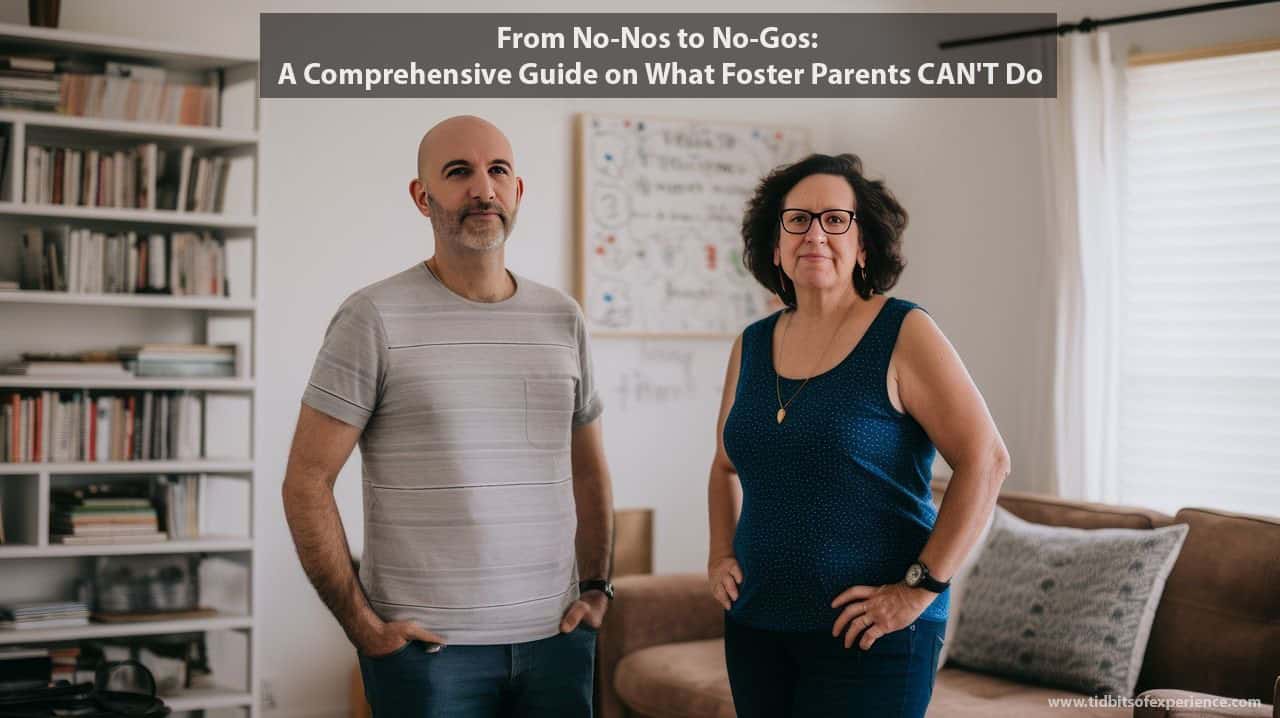Foster parenting is a noble and rewarding journey, but it also comes with its unique set of challenges and responsibilities. One crucial aspect of being a foster parent is understanding the rules that govern their role to ensure the safety and well-being of foster children.
In this blog post, we’ll delve into what foster parents are not allowed to do by exploring essential guidelines, rules, and the consequences that come with breaking them.
These insights will not only help current and prospective foster parents navigate this complex system more effectively but also promote better care for the vulnerable children they look after.
Key Takeaways
Foster parents are not allowed to physically discipline or abuse their foster children. Instead, alternative methods of discipline, such as time-outs or loss of privileges, should be used.
Neglecting or abusing a foster child is strictly prohibited and can result in severe consequences such as loss of licensure or termination of placement.
Foster parents must respect their foster child’s privacy rights by avoiding invasive measures without good cause and obtaining permission from relevant authorities for any visits from unknown individuals. Improper behavior can lead to serious legal consequences.
Using the funds or assets designated for the care and well-being of a foster child for personal gain is both illegal and immoral. Foster parents must keep accurate records, seek approval before using these funds, and prioritize the needs of their children above all else.
Table of Contents
What Is Foster Parenting?

Foster parenting is the selfless commitment to providing a temporary, safe, and nurturing home for children who have been removed from their biological families due to neglect, abuse, or other safety concerns.
Individuals or couples become foster parents after undergoing a rigorous evaluation process by child welfare agencies like Child Protective Services (CPS) or licensed private agencies.
At its core, foster parenting entails attending to each child’s unique physical, emotional, and developmental needs as they navigate through an incredibly challenging time in their lives.
This may include ensuring proper nutrition; supporting them academically; helping them maintain connections with siblings or extended family members; and offering therapeutic interventions that help build resilience against past traumas.
One powerful example of fostering’s positive impact is witnessing previously withdrawn children gradually develop meaningful relationships within their new environments – sometimes even finding remnants of joy amid personal strife.
Key Guidelines For Foster Parents

Foster parents must follow a strict set of guidelines that prohibit physically disciplining and neglecting foster children, denying medical treatment or medication, invading their privacy without reason, and more.
Physically Disciplining A Foster Child
Physical discipline, also known as corporal punishment, is strictly prohibited in the foster care system. Foster parents must rely on alternative discipline methods to teach and guide their foster children effectively.
It’s essential for foster parents to understand that many children entering the foster care system have experienced trauma or abuse in their past. This makes it even more crucial for them to create a safe and nurturing home environment where trust can be built with genuine affection and understanding.
Neglect Or Abuse Of A Foster Child
Neglect or abuse of a foster child is strictly prohibited and against the guidelines set by the state or agency for foster parents. Neglect refers to failure to provide essential needs such as food, water, proper shelter, emotional support, love, and care to the child.
The purpose of fostering is to provide a stable and supportive environment that nurtures a child’s well-being while they transition through this turbulent time in their lives.
Subjecting them to further harm stands in direct contradiction to these goals. Some examples that would qualify as neglectful behavior include leaving children without adequate supervision for long periods or failing to address medical needs when necessary; abusive behaviors might involve using harsh disciplinary measures like spanking or engaging in emotional manipulation intended only to control the child.
Denying Medical Treatment Or Necessary Medication
Foster parents are not allowed to deny medical treatment or necessary medication to their foster children. As a parent, it is your responsibility to ensure the proper health and care of your child, including when they are under your foster care.
Denying them access to medical attention or critical medications can have serious health consequences for them, which could lead to long-term damage. Administrating any medication without first obtaining a doctor’s approval is also against foster care rules.
It’s best if you keep an open line of communication with the child’s caseworker and doctors throughout the duration of their stay with you in order to ensure that they receive proper healthcare whenever needed.
Giving Medication Without A Doctor’s Approval
As a foster parent, administering medication to your foster child without proper medical consent is strictly prohibited. Foster parents must follow the instructions of the child’s physician and ensure that medication is administered correctly as instructed.
Failure to do so can result in severe health consequences for the child and legal consequences for you as a foster parent. In some cases, giving medication without approval may lead to charges of abuse or neglect against the foster parent.
Always consult with your caseworker or medical professional before administering any form of medication to your foster child.
Invading A Foster Child’s Privacy Without Valid Reason
Foster parents should always respect a foster child’s privacy and avoid violating their personal space without a valid reason. This means avoiding unnecessary searches of the child’s belongings and room, monitoring phone conversations or emails without good cause, or invading their personal privacy in any other way.
While it is important to ensure that foster children are safe and well-cared for, this should not come at the expense of their privacy rights.
For instance, a foster parent may have concerns about a child’s online activity, but instead of immediately monitoring all communications, they should try talking with them first.
It is essential to establish an environment where trust is built between the caregiver and the child from day one.
Allowing Unsupervised Visitation With Unknown Individuals
One important foster care rule is that foster parents should never allow unsupervised visitation with unknown individuals. This means that any visitors, whether friends, family members, or acquaintances of the foster child, must be supervised by a responsible adult at all times while in the presence of the child.
Allowing unsupervised visitation can put children at risk of harm because they may not know who these people are or what their intentions may be. As such, it is critical that foster parents take this rule seriously and follow proper protocols to ensure their child’s safety and well-being at all times.
Making Decisions About A Foster Child’s Education Without Consulting Their Caseworker
As a foster parent, it is important to involve the child’s caseworker in any decision-making processes related to education. Foster parents are not allowed to make decisions about their child’s education without consulting their caseworker or school officials.
This includes enrolling the child in school or serving as an advocate in court proceedings for children in foster care. It is crucial that foster parents communicate openly with the child and their caseworker about any education-related decisions.
Breaking these rules can lead to serious consequences, such as loss of licensure or termination of placement.
Allowing A Foster Child To Drive Without A Valid License And Insurance
As a foster parent, it is crucial to follow transportation guidelines for your foster child’s safety. Allowing a foster child to drive without a valid license and insurance is both illegal and dangerous.
Not only does this put the child at risk of accidents or legal trouble, but it also puts you, as the foster parent, in liability. It’s important to ensure that any driving done by your foster child has proper supervision and adherence to traffic laws.
Consider alternative modes of transportation, such as public transit or coordinating with other caregivers when necessary.
Using A Foster Child’s Funds Or Assets For Personal Gain
It is important for foster parents to recognize that misusing or mishandling a foster child’s funds or assets can lead to serious legal and financial consequences.
Foster parents should always seek approval from the child welfare agency before using any of the foster child’s funds or assets, keeping accurate records of all expenditures related to these funds.
Examples of misuse may include taking money designated for the care and well-being of the foster child to pay for personal expenses like rent, utilities, groceries, or other unrelated expenditures.
It is vital that foster parents ensure that they are managing these resources responsibly and in the best interest of the child, providing receipts and documentation for all expenses relating to their use.
If there are concerns about how a foster parent may be using a child’s funds, it is crucial for them to report this immediately to their caseworker as they lack authority over these matters in court proceedings.
Discriminating Against A Foster Child
Foster parents are not allowed to discriminate against a foster child in any way, including race, religion, gender identity, or sexual orientation. Every foster child deserves respect and kindness, regardless of their background or upbringing.
Forcing a foster child to conform to your own beliefs or practices is not acceptable; instead, you should celebrate diversity and encourage the growth and development of every individual under your care.
One example of discrimination can be denying a foster child food that aligns with their religious beliefs or pressuring them to participate in religious activities they do not feel comfortable with.
Allowing A Foster Child To Engage In Illegal Or Dangerous Activities
Foster parents must prioritize the safety of their foster child above all else. This means that they cannot allow their foster child to engage in any illegal or dangerous activities, such as drug use or reckless behavior.
It is important for foster parents to provide a stable and nurturing environment for their fosters children. It is not acceptable to put them at risk by allowing them to engage in harmful behaviors.
Instead, foster parents should focus on positive reinforcement and providing opportunities for healthy development and growth.
Leaving A Foster Child Unsupervised
Leaving a foster child unsupervised is strictly prohibited in the foster care system. This includes not leaving them alone at home or in a car, as well as not allowing them to participate in any potentially harmful activities without adult supervision.
Unsupervised time can put children at risk of self-harm or getting involved with illegal substances or dangerous situations. As a foster parent, it’s essential to provide a safe and secure environment for your foster child by keeping an eye on their whereabouts and ensuring they are always supervised by responsible adults when outside the house.
Altering A Foster Child’s Appearance
As a foster parent, it’s important to respect a foster child’s physical appearance and not make any alterations without the permission of their caseworker and biological parents.
This includes things like changing their hair color or style, tattooing their body, piercing their ears without consent, or forcing them to wear uncomfortable clothing. Altering a child’s appearance can be traumatic for them and may lead to feelings of resentment towards you as the caregiver.
It is also essential that you understand that any changes made to the child’s external appearance should reflect what they want rather than fulfilling your personal preference.
Sharing A Foster Child’s Face On Social Media
Sharing pictures of foster children on social media is not allowed without proper authorization or consent from caseworkers and biological parents. Doing so can put the child at risk, including privacy breaches, identity theft, or unwanted contact with strangers.
Foster parents must respect a child’s right to privacy and ensure their well-being above all else. It’s important to keep in mind that foster children have experienced trauma and may be sensitive to having their image shared publicly without their consent.
Instead, foster parents should ask for permission before sharing any information online and make sure it aligns with the guidance set by the state authorities.
Co-sleeping With A Foster Child
Co-sleeping with a foster child can be a sensitive issue and is generally discouraged. It’s important to establish appropriate physical boundaries with your foster child to avoid any accusations of abuse or neglect.
Additionally, co-sleeping may interfere with establishing healthy sleep habits for the child. It’s crucial to provide a safe and secure sleeping space for your foster child that meets their basic needs while supporting their emotional well-being.
Before making any decisions about whether or not to allow co-sleeping, consult with your caseworker to consider the risks and benefits carefully.
Rules For Foster Parents

Foster parenting can be a challenge, but it is also a rewarding experience that can make a positive impact on the lives of children. As foster parents, there are some rules and guidelines that need to be followed to ensure the safety and well-being of the children in your care. Here are four essential rules that every foster parent needs to understand:
- Maintain confidentiality: Foster parents must keep all information related to their foster child confidential. This includes their personal information, history, and any legal proceedings they may be involved in.
- Follow visitation guidelines: Foster parents must follow the visitation guidelines set by the state or Child Protective Services (CPS). This could include supervised visits or visits with biological family members.
- Attend all required meetings: Foster parents are required to attend all meetings related to their foster child’s care, including medical appointments and court hearings.
- Communicate effectively: Foster parents should maintain open lines of communication with everyone involved in their child’s case. This includes caseworkers, social workers, therapists, and biological family members.
By following these rules, foster parents can provide a safe and supportive environment for their foster children while also meeting all legal obligations. Remembering these guidelines can help create a more positive experience for both you and the children in your care.
Consequences Of Breaking The Rules

If foster parents break any of the rules set by their state or agency, they may face severe consequences such as loss of licensure, termination of placement, and even legal action.
Loss Of Licensure
If foster parent breaks any of the rules or guidelines set by their state, they risk losing their licensure. This means that they will no longer be able to provide care for foster children and may even face legal action.
Some common reasons for loss of licensure include physical discipline or withholding food/water as punishment, violating a foster child’s privacy without a valid reason, and allowing unsupervised visitation with unknown individuals.
Termination Of Placement
One of the biggest consequences of breaking foster care rules is the termination of placement. This means that the foster child will be removed from your home and placed elsewhere, which can be traumatic for them.
Additionally, losing a foster placement can have serious repercussions on your ability to continue fostering in the future. Let’s say you’re a Colorado resident who has been providing excellent care for several kids.
It’s important to always prioritize the safety and well-being of your foster child by following all guidelines set out by both the government agency overseeing fostering (such as North Carolina’s Department of Human Services) and any additional regulations specific to your particular child-placement agency (like Marjorie R. Rogers’ Courage Community Foster Care).
Legal Action
Breaking foster care rules and guidelines can result in legal action being taken against the foster parents. Legal action may include formal investigations, loss of licensure, termination of placement, and even criminal charges such as neglect or abuse.
In some cases where legal action is taken, social workers or court officials overseeing the case will appoint legal representation for the child or adolescent in question.
This is done to ensure that all parties involved in the foster care arrangement receive fair treatment in accordance with state regulations and laws governing child welfare agencies.
Foster Care Requirements

To become a foster parent, you must meet certain criteria, such as being at least 21 years old and passing criminal background checks.
Minimum Age To Be A Foster Parent
To become a foster parent, you must be at least 21 years old. Agencies prefer younger individuals to help ensure that the foster child has a parent who will be able to care for them long-term.
However, agencies won’t turn away potential parents older than 55 as long as they are physically and mentally capable of taking on the responsibility of caring for a child.
Prospective foster parents must also have stable income sources and housing situations, pass criminal background checks, and undergo home study assessments before being approved.
Criteria For Being A Foster Parent
To become a foster parent, there are several criteria you must meet. First, you must be at least 21 years old and have a stable home environment that can accommodate the needs of a child.
Additionally, you will need to undergo various background checks, including criminal history and child abuse record screenings. Your home will also need to pass safety inspections and meet certain health standards.
Finally, completing training programs and obtaining certification from your state’s foster care agency is mandatory before being approved as a foster parent.
Requirements To Become A Foster Parent
Becoming a foster parent is a crucial responsibility that involves providing care and support to children who have experienced trauma or neglect. To become a foster parent, you must meet specific requirements set by the state. These include:
- Age: Foster parents must be at least 21 years old.
- Background check: Foster parents must undergo background checks to ensure they do not have any criminal history or record of child abuse or neglect.
- Home inspection: A social worker will conduct an inspection of your home to ensure that it meets safety standards and has enough space for a foster child.
- Income: Foster parents must have a stable source of income to provide for their family’s needs and those of their foster child.
- Health: Foster parents must be physically and mentally healthy and able to care for a child with special medical or emotional needs.
- Training: Foster parents must complete training programs on effective parenting techniques, trauma sensitivity, and the legal rights of foster children.
By meeting these requirements and being willing to work with the child welfare agency, birth families, and other involved parties, you can become a foster parent and provide much-needed stability and support to vulnerable children in your community.
Foster Home Requirements
To become a foster parent, there are certain requirements you must meet. Here are the most common foster home requirements:
- Age: Foster parents must be over 21 years old.
- Background check: Criminal background checks are mandatory for foster parents and anyone else living in their households.
- Home study: Prospective foster homes undergo an inspection by the child placement agency to ensure they offer a safe and comfortable environment for foster children.
- Income: Foster parents need to have a stable source of income that can adequately support a child’s needs.
- Space: The state requires all foster children to have their own beds, so there must be enough space in the home for them.
- Training: Foster parents must complete training courses that cover relevant topics such as child development, trauma sensitivity, effective discipline techniques, and legal representation.
- Health requirements: Both physical and mental health screenings may be required of prospective foster parents to ensure they are fit to care for children.
- Multiple references: Foster care agencies will ask for references to ensure prospective parents have a solid support system and good character.
Meeting these requirements is crucial if you want to become a licensed foster parent in your state. Keep in mind that each state may have additional or slightly different requirements, so it’s important to research what your state specifically requires before beginning the process.
Income Requirements To Be A Foster Parent
To become a foster parent, there are income requirements that you must meet. This depends on the state in which you live and your household size. For example, some states require that you make at least $30,000 per year to qualify as a foster parent.
It’s important to note that being a foster parent isn’t about making money; instead, it’s about providing love and support to children who need it most. Foster parents receive financial assistance from the government to help cover expenses related to caring for their foster children.
What Disqualifies You From Being A Foster Parent?

Becoming a foster parent is not an easy task, and there are specific requirements that each candidate must meet to qualify. In addition, certain factors may disqualify you from being a foster parent.
Moreover, substance abuse problems can also prohibit individuals from fostering children. If you have had issues with alcohol or drug addiction in the past five years, for instance, your application may be denied.
It’s important to remember that every state has its own set of guidelines and regulations when it comes to fostering children; thusly, disqualification factors might vary slightly depending on where one resides.
Frequently Asked Questions About What Foster Parents Can and Can’t Do
What are some common examples of things foster parents are not allowed to do?
Foster parents are not allowed to physically abuse, neglect, or harm the children in their care in any way. They also cannot use profane language around them, punish them excessively, or deny them medical care.
Are there any restrictions on disciplining foster children?
Yes, there are specific guidelines that dictate how discipline should be handled with foster children. Discipline should always be age-appropriate and non-violent and should take into consideration each child’s individual background and experiences.
What happens if a foster parent violates the rules?
If the foster parent is found to have violated the rules governing their care of children, they may face consequences such as losing their license to provide foster services or having legal action taken against them, depending upon the severity of the offense.
Can anyone become a foster parent regardless of their criminal history?
There are comprehensive background checks that every potential foster parent must pass before they can become licensed to work with vulnerable youth – this includes criminal record checks & suitability assessments, which aim at ensuring safety for all involved parties throughout the duration of the placement period.
Conclusion
In conclusion, foster parenting is challenging but rewarding work that requires a great deal of dedication and responsibility. Foster parents must follow strict rules and guidelines to provide a safe and nurturing environment for their foster children.
Physically disciplining or abusing them, sharing their pictures on social media without permission, denying medical treatment or withholding food, and violating their privacy are strictly prohibited.
Failure to comply with these rules can lead to severe consequences, such as termination of placement or loss of licensure.
